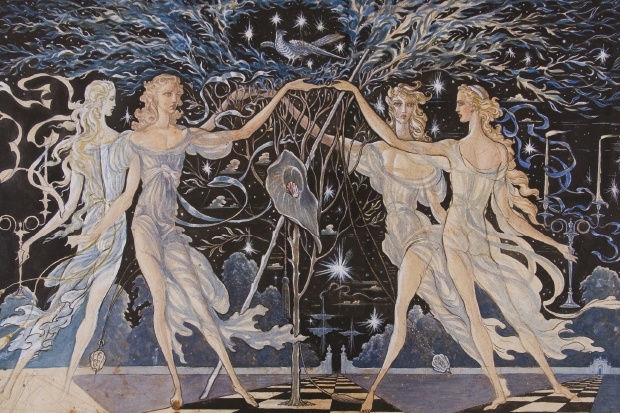Lore has it that those viewing naughty books in the British Museum could once do so only with the Archbishop of Canterbury in attendance. Such pastoral care may be advisable for any institution ending up with the private archive of letters, diaries and artwork from which Joscelyn Godwin compiles this eccentric and nicely produced account of his parents’ lives from 1940 to 1948.
Edward Fell Scott-Snell and Stephani Mary Allfree met in 1935 and set about cultivating Thessyros, a fantasy land Edward had already sown with overripe imagery and peopled with priapic cupids, ageing debauchees and, Godwin explains, ‘assorted gardeners, priests, and organists who gleefully seduce their willing, under-aged charges’. The world unfurls collaboratively in diaries, letters and paintings, which rather weakly evoke Cicely M. Barker’s Flower Fairies, Blake and Whistler. The icky enterprise drinks deep of the fin de siècle. As Stephani recalled:
De Sade, Beardsley, Wilde, Max Ernst, Montague Summers, Corvo, Dali, the Pre-Raphaelites, as well as the obscurer classics — I absorbed them all as if I were working for a degree in decadence.
Things slipped easily from page to bed. ‘Tonight,’ her diary confides, ‘we loved exquisitely without the aid of sadism, and naked except for blindfolding.’

The archive records life beyond the fanciful borders of Thessyros. Two babies and marriage come along, each resented by the increasingly neurotic and cruel Edward. Bobbing west from Oxford and London on a river of booze (‘We gave Felix some gin; he behaved very well, lying in his Moses basket’), they end up at William Morris’s Kelmscott Manor where, unbothered by bombs falling elsewhere, they get blitzed on Benzedrine, or as they prettily name it, starlight. That does little to sober up the prose or mute the paintings but much to stimulate an obsession with Morris and the Pre-Raphaelites to the exclusion of everything since. In truth, it’s a painful folie-à-deux, with Edward (schoolmaster, no less) either seducing Stephani with his grotesquely sumptuous prose —
So my dear Stephani, comes Cupid on the day of his wedding: and we leave him today kneeling among his bridesmaids, his eyes downcast, his penis coloured strangely in the stained glass shadows
— or slapping her awake with spite: ‘Do you mind, or not, my sleeping with someone else?’
An epilogue tells us that Edward and Stephani kept heading west, working as authors and illustrators in America until divorce in 1954. Felix became a rocket scientist. Joscelyn, born in Morris’s famous bed, is now a professor of music, with expertise in the occult. Goodness knows what lies in the bulk of the archive he has not used, but the rummage cannot have been easy. All the more reason to admire the cheerfully honest gloss he uses throughout to piece together his parents’ directly quoted words. ‘Edward took it for granted that the newborn child would be put up for adoption, and tried to advertise him in the newspapers,’ he observes of his tiny self. Adopted he was, and in the end we realise the unsettling story is as much his as theirs.






Comments